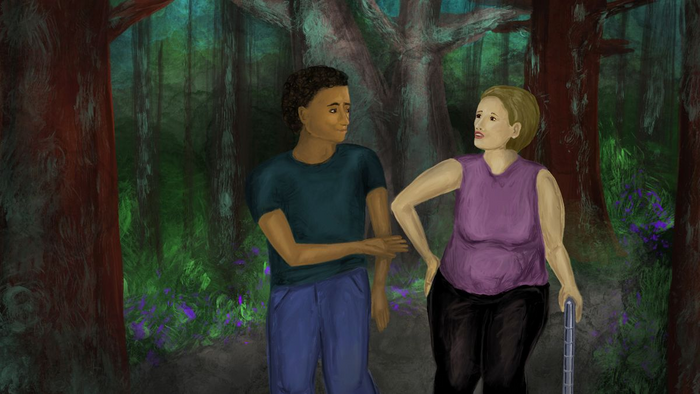Although it’s well known that regular exercise can reduce musculoskeletal pain, some chronic pain sufferers avoid it hoping to minimize their symptoms. One West Virginia University researcher aims to change this behavior in people experiencing chronic hip pain by developing a biopsychosocial intervention addressing the physical and psychological aspects of rehabilitation simultaneously.

Credit: WVU Illustration/Aira Burkhart
Although it’s well known that regular exercise can reduce musculoskeletal pain, some chronic pain sufferers avoid it hoping to minimize their symptoms. One West Virginia University researcher aims to change this behavior in people experiencing chronic hip pain by developing a biopsychosocial intervention addressing the physical and psychological aspects of rehabilitation simultaneously.
Kate Jochimsen, assistant professor and director of research in the WVU School of Medicine Division of Athletic Training, is motivated by the frustration and hopelessness that she observes in some patients participating in the current unidimensional, siloed treatment of chronic hip pain. She plans to develop and implement Helping Improve PSychosocial Health — or HIPS — a mind-body intervention delivered by physical therapists, with support from the West Virginia Clinical and Translational Science Institute.
Jochimsen received a $769,697 National Institutes of Health award and funding through the National Center for Complementary and Integrative Health to back her efforts.
“Current treatment options for patients with non-arthritic hip pain conditions work well for some. However, many are left with an unacceptable level of pain and dysfunction. In addition, patients in rural West Virginia communities are especially vulnerable to the disability associated with failed treatment due to rampant comorbidities and economic disparities,” Jochimsen said.
She is committed to helping change that through the holistic management of musculoskeletal pain conditions that goes beyond current treatment which follows an outdated model largely ignoring the impact of psychological health.
“A negative psychological response to injury is common and further reinforces low physical activity participation,” she said. “The HIPS mind-body intervention is multimodal and will include aspects of mindfulness like self-compassion, progressive relaxation and mindful awareness of pain, as well as goal setting, pain education, adaptive thinking and diaphragmatic breathing techniques that will be taught and incorporated into rehabilitation.”
For example, Jochimsen said patients will be taught to use diaphragmatic breathing when noticing anxiety about pain or self-compassion when not meeting their physical activity goals.
“My goal as a rehabilitation clinician is to treat the whole person, not just the injury. If I can help to reduce a patient’s injury-related fear or increase their confidence to be physically active while also making them stronger and retraining their movement — it’s a win-win,” she said.
The five-year NIH-funded project is broken into three stages including intervention development, refinement and a feasibility randomized controlled trial. Jochimsen is already interviewing patients with chronic hip pain, and the physical therapists who treat them, to identify intervention and training preferences. For the feasibility randomized controlled trial, physical therapists will provide participants with three mind-body sessions in the laboratory and three sessions on the phone. Subsequent trials will embed the mind-body intervention into the flow of the physical therapy clinic.
Robin Pollini, an associate professor in the WVU School of Medicine and WVU School of Public Health, will serve as a co-mentor of the trial. Jochimsen and Pollini will work with Ana-Maria Vranceanu of Harvard Medical School and Massachusetts General Hospital and Cale Jacobs of Mass General Brigham. Sijin Wen, Dr. Derik Geist and Ronald Reed, all of WVU, will provide additional mentorship, as will Kristin Archer of Vanderbilt University and Trevor Jones of HealthWorks Rehab & Fitness in Morgantown.
WVCTSI is funded by an IDeA Clinical and Translational grant from the National Institute of General Medical Sciences (U54GM104942) to support the mission of building clinical and translational research infrastructure and capacity to impact health disparities in West Virginia.




